Episodes
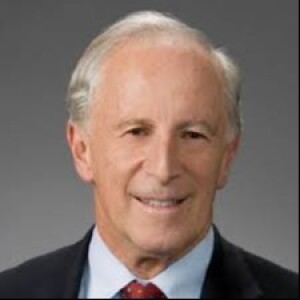
Saturday Oct 21, 2023
Saturday Oct 21, 2023
As featured in The Australian 23 April 2019
In this interview I speak with former Family Court Judge, The Honourable Peter Rose AM QC (now Mediator, Arbitrator and Adjunct Professor at Sydney University and also my mentor for several years) about the ‘the good, the bad and the ugly’ (my words) in relation to the recommendations for family law reform in the ALRC report.
For more on the Inside Family Law book see www.mediationanswers.com.au
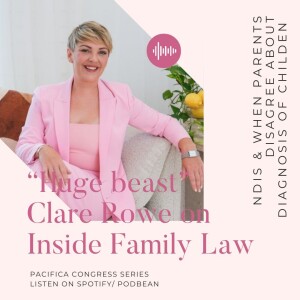
Thursday Oct 19, 2023
Thursday Oct 19, 2023
“huge beast” – Clare Rowe on NDIS & parents disputes about diagnosis of children at the Pacifica Congress conference
Listen in https://www.podbean.com/eas/pb-ujz8a-14d6128
Clare Rowe https://www.roweandassociates.com.au/ Clare has presented at Pacifica Congress events several times including at their Plus One event in Sydney 2023. Clare, through the Family Report Writer’s Network is sponsoring the Inside Family Law Podcast Champagne Celebration.
At the Pacifica Congress Conference live in Hobart 2023 www.pacificacongress.org
The Inside Family Law Podcast is hosted by Zoe Durand at Mediation Answers www.mediationanswers.com.au in partnership with Lawyer Magic and ArtWork.
If you would like to attend the champagne celebration on 1 November 2023 for the Inside Family Law and network with our remarkable guests that we have hosted over the years secure your spot at: https://www.eventbrite.com.au/e/736405357247?aff=oddtdtcreator
- “10% of 5 to 7 year old boys are on the NDIS”
- No actual test as such for autism or ADHD. It is the professional opinion for such a diagnosis, but 2 different professionals could have different views.
- Funding is tied to diagnosis.
- What are the implications of a diagnosis of say autism?
- Pressure on psychologists to diagnose given otherwise parents lose their funding, which could negatively impact family.
- Autism 1, 2, 3 (only 2 and 3 receive funding). Clare has not yet seen a diagnosis of autism 1, because there is no funding for this. Dynamic between what we diagnose and funding.
- Dynamic where parents polarise. I.e one prefers nachos and video games and the other prefers vegan lifestyle. They become more extreme once separated. Then party A says the child isn’t eating healthy food in party B’s home and Party B says the child is not being fed properly on an overly restrictive diet. When together they balance each other. Once apart “they become more them”.
- This is understandable to an extent as when people separate they go out to find themselves.
- Clare’s involvement in matters where one party asserts a diagnosis and the other disputes it. Different outcomes in those matters. In one case mother had Munchhausen’s by proxy and was unwell and in others the child should have been diagnosed and the other parent disputing it was asked to be involved and learn about the child’s needs etc.
- Sometimes the reason a parent disputes a diagnosis is because they were not involved in that diagnosis in the first place and once they are involved they can engage with recommendations.
- Is there sometimes a tendency to pathologize human variance?

Thursday Oct 19, 2023
Thursday Oct 19, 2023
“out of your comfort zone” – Fiona Kirkman on technology and AI in family law at the Pacifica Congress conference
Fiona Kirkman from FamilyProperty (https://www.familyproperty.com.au/team). FamilyProperty were sponsors of the Pacifica Congress conference in Hobart 2023. They are also sponsoring the Inside Family Law Champagne Celebration.
At the Pacifica Congress Conference live in Hobart 2023 www.pacificacongress.org
The Inside Family Law Podcast is hosted by Zoe Durand at Mediation Answers www.mediationanswers.com.au in partnership with Lawyer Magic and ArtWork.
If you would like to attend the champagne celebration on 1 November 2023 for the Inside Family Law and network with our remarkable guests that we have hosted over the years secure your spot at: https://www.eventbrite.com.au/e/736405357247?aff=oddtdtcreator
- Technology can be used to smooth over the pain points in our work.
- We will discuss “how can technology help with automating some of the repetitious manual work to make things more efficient.”
- Some parts of the process that technology can assist in include:
- Intakes and initial client information i.e gathering of information
- Balance sheet
- Disclosure
- “Get out of your comfort zone and try it.” At first it takes time to learn how to use technology, but once you use it, it is difficult to go back to pen and paper.
- Important for retention, in particular of younger lawyers in firms to use technology to make work more efficient.
- AI can be useful in family law, however be aware of example when AI hallucinated cases. A
- Clients are aware of AI and use chat GP. Chat GP comes up in matters in family law matters.
- AI will not replace lawyers, but technology can be used to replace parts of our work that are repetitious.
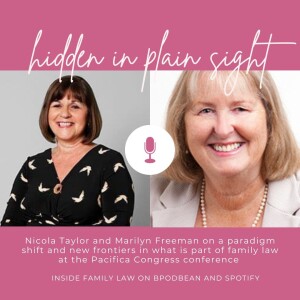
Thursday Oct 19, 2023
Thursday Oct 19, 2023
“hidden in plain sight” – Nicola Taylor and Marilyn Freeman on a paradigm shift and new frontiers in what is part of family law at the Pacifica Congress conference
Nicola Taylor https://www.otago.ac.nz/cic/staff/professor-nicola-taylor
Dr Marilyn Freeman https://www.westminster.ac.uk/about-us/our-people/directory/freeman-marilyn
At the Pacifica Congress Conference live in Hobart 2023 www.pacificacongress.org
The Inside Family Law Podcast is hosted by Zoe Durand at Mediation Answers www.mediationanswers.com.au in partnership with Lawyer Magic and ArtWork.
If you would like to attend the champagne celebration on 1 November 2023 for the Inside Family Law and network with our remarkable guests that we have hosted over the years secure your spot at: https://www.eventbrite.com.au/e/736405357247?aff=oddtdtcreator
- “There are a whole lot of transitions and experiences that children and young people have.”
- Gender dysphoria, child soldiers, children sports people.
- Opening up the space for what is family law to include issues for young people around identity and its formation and its disruption.
- “Identity formation is critical to the way we think about children.
- “Identity formation is one of the key aspects of childhood development.” Nicola.
- Overall it was received positively at the conference (expanding the understanding of family law).
- Paradigm shift to look at what are children’s experiences “hidden in plain sight”.
- An attendee said “I’m going to do my work differently” (Marilyn).
- Donor children, care and protection work, asylum seeking children.
- A different paradigm rather than entering through adults experiences (i.e what happens to an adult, ie marriage, separation, divorce) but instead what are the experiences children move through (Zoe). Youth Law Australia.
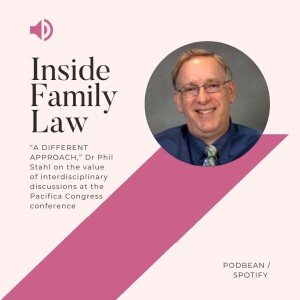
Thursday Oct 19, 2023
Thursday Oct 19, 2023
“a different approach” – Phil Stahl on the value of interdisciplinary discussions at the Pacifica Congress conference
Phil Stahl (https://parentingafterdivorce.com/)
At the Pacifica Congress Conference live in Hobart 2023 www.pacificacongress.org
The Inside Family Law Podcast is hosted by Zoe Durand at Mediation Answers www.mediationanswers.com.au in partnership with Lawyer Magic and ArtWork.
If you would like to attend the champagne celebration on 1 November 2023 for the Inside Family Law and network with our remarkable guests that we have hosted over the years secure your spot at: https://www.eventbrite.com.au/e/736405357247?aff=oddtdtcreator
- Discussion on Dr Phil Stahl’s take aways from the Pacifica Congress Conference in Hobart 2023.
- Why Dr Phil Stahl is a part of the Pacifica Congress Conference.
- Supercharged testimony talk at the conference.
- Differences in the approach in the USA.
- Tips to improve the quality of reports and assessments.
- Discussion of coercive control at Pacifica Congress 2023
- History of Pacifica Congress and predecessor AFCC.
- Learning from others who are not in psychology ie lawyers and Judges.
- Bringing together leaders in the field.
- Importance of lunchtime chats and informal discussions.
- Interdisciplinary work in family law and psychology in shades of grey, “but the law tends to be black and white.”
- “we can all learn from each other. We all work with children.”
- Connections made through Pacifica are important, they become like family.
- When we step back… we can then take a different approach to things.”
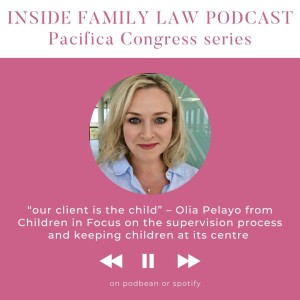
Thursday Oct 19, 2023
Thursday Oct 19, 2023
“our client is the child” – Olia Pelayo from Children in Focus on the supervision process and keeping children in the centre of it at the Pacifica Congress Conference series.
Olia Pelayo (https://www.childreninfocus.com.au)
At the Pacifica Congress Conference live in Hobart 2023 www.pacificacongress.org
The Inside Family Law Podcast is hosted by Zoe Durand at Mediation Answers www.mediationanswers.com.au in partnership with Lawyer Magic and ArtWork.
If you would like to attend the champagne celebration on 1 November 2023 for the Inside Family Law and network with our remarkable guests that we have hosted over the years secure your spot at: https://www.eventbrite.com.au/e/736405357247?aff=oddtdtcreator
- Process, applications, forms etc and timeline (usually about 1 week from applying to be able to supervise).
- Locations that Children in Focus can attend
- How the role is explained to children. “Meet and greet” with children.
- Concerns of clients about supervision and Olia’s responses.
- Children in Focus work with the family as to what the children have been told about their role. Sometimes the children are fearful to see their parent and the children are fine to refer to them as the supervisor. In the meet and greet they explain the process, what will happen and if any safety words etc needed.
- “keeping the children safe basically” is the role of the supervisor.
- When the supervisor will intervene. I.e. immediate if child is hit etc. If there is a negative comment made, then supervisor may intervene and ask the parent to stop this behaviour. If behaviour continues then they may have to terminate visit.
- What is included in reports. Objective observation, things said to children, interactions, communication.
- Pure observation. No recommendations, opinions etc.
- Pathway families move through when using supervision. Supervision can be longer term. Sometimes it can be very brief for some reassurance and to build trust.
- Reports can mirror back to parents what their actions are.
- How reports can provide feedback and be a mirror for parents.
- Locations and also the cost of supervision.
- Qualifications of supervisors and training they receive.
- Issue when parents are paying for supervision and they then perceive themselves as the client who is paying for the service.
- Zoe: “In a way it is parents paying for the service… the payer has the power… so how does that work in protecting and empowering children when they are not the payer?”
- “Sometimes clients say “Well I paid for you, you better put this in the report the way I want it”… and “We say excuse me no, our client is the child. And we are here to make sure we do everything in the best interests of the child….We don’t take stuff like that from clients.”
- Important things to remember to include in Orders when supervisors are appointed. Ie be careful about being too specific on times before you have the supervisor appointed, ie what if the supervisor cannot attend at this time. Leave flexibility for the times the supervisor can attend. “At a time chosen by the supervisor” or a wording that allows the supervisor to nominate the time.
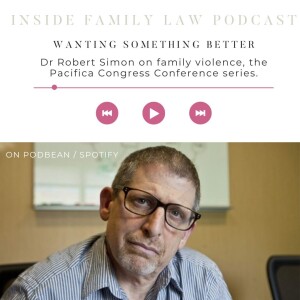
Thursday Oct 19, 2023
Thursday Oct 19, 2023
“wanting something better” – Dr Robert Simon on family violence at the Pacifica Congress Conference series.
Dr Robert Simon (https://www.dr-simon.com/)
At the Pacifica Congress Conference live in Hobart 2023 www.pacificacongress.org
The Inside Family Law Podcast is hosted by Zoe Durand at Mediation Answers www.mediationanswers.com.au in partnership with Lawyer Magic and ArtWork.
If you would like to attend the champagne celebration on 1 November 2023 for the Inside Family Law and network with our remarkable guests that we have hosted over the years secure your spot at: https://www.eventbrite.com.au/e/736405357247?aff=oddtdtcreator
- Film The Fort.
- Coercive controlling violence, intergenerational transmission of this.
- Mother finds her voice and stands up to the father, father kills the mother in the film.
- Perpetrator renders the victim helpless in a number of ways.
- Can included financial, physical and other forms of control.
- Gender symmetry in other forms of violence in families, but not in coercive controlling violence which is mainly male to female.
- Zoe asks: why is it that coercive controlling violence is so gendered?
- Lack of empathy of perpetrators.
- How do you stop this form of violence? On an individual level perpetrator may seek psychotherapy and also want to change.
- Victims can exit the relationship. Noting this is an extremely difficult and vulnerable time for victims as this is when they are in the most danger.
- “perpetrators don’t find court orders to be anything other than suggestions… and they’ll violate them” (even though they are not just suggestions, this is their perception).
- Shelters and supporting escape from the relationship. Location often not disclosed.
- On a societal level we have to make the knowledge of it common… we need to change it from being an ugly secrete that’s swept under the rug to something that everybody knows takes place and is willing to talk about. We need to educate all of us about the signs and signals that somebody is in trouble… and teach people how to do a little bit of outreach…”
- Case by case approach/. One person at a time.
- “At that moment of leaving that victim is at greatest risk.”
- 1 woman a week dies in Australia at the hands of a partner/ ex partner.
- “Battery programs” in the USA. Research suggests these are not that effective.
- Change doesn’t occur “unless a person is sincerely motivated… and sincere motivation is not escaping punishment, sincere motivation is wanting something better.”
- Victims still feel a lot of shame about family violence. We need to take the humiliation sting out of it.
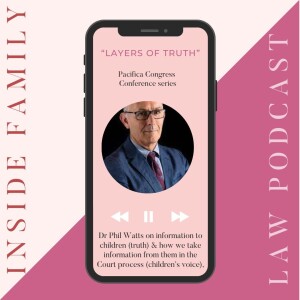
Wednesday Oct 18, 2023
Wednesday Oct 18, 2023
“layers of truth” – Dr Phil Watts on information to children (truth) & how we take information from them in the Court process (children’s voice), Pacifica Congress Conference series
Dr Phil Watts (https://www.mindstatepsychology.com.au/)
At the Pacifica Congress Conference live in Hobart 2023 www.pacificacongress.org
The Inside Family Law Podcast is hosted by Zoe Durand at Mediation Answers www.mediationanswers.com.au in partnership with Lawyer Magic and ArtWork.
If you would like to attend the champagne celebration on 1 November 2023 for the Inside Family Law and network with our remarkable guests that we have hosted over the years secure your spot at: https://www.eventbrite.com.au/e/736405357247?aff=oddtdtcreator
- The voice of children
- “Children need to be heard, but we need to very careful involving them in a legal process. If they say too much or get too involved then it’s stressful, if they don’t get heard then they feel powerless and anxious and that’s not helpful either.”
- Sometimes children want to please both parents and may say different things to each parent to please them.
- Different things can happen:
- They speak their mind – this can be hard to do
- They duck for cover – try to stay out of dispute and say nothing wrong.
- They pick sides – different ways they can do this. Can be aligning with most powerful side.
- They don’t trust anyone.
- “layers of truth… its got to be at an appropriate level for their age of development.”
- Listen to what they are actually asking.
- Judges interviewing children. We need to look at the skill set of the person speaking with the children.
- Distinction between children’s likes vs children’s wishes. Important children understand that their “wishes” are not necessarily going to be “granted” as such or this breaks more trust.
- Dr Watts discusses what he says to children when he meets them. That he wants to find out what they like and what they don’t like to help the adults make the decisions best for them.
- “We should be talking about likes not wishes.”
- Within the existing system there are things Judges can do. Example about Judge drafting a statement of truth for the children as assisted by Dr Watts.
- “There are things we can do now.”
- “Children are not little adults, they have their own unique view of the world and we need to understand them.”
- “the better the court knows what the child is like” the more we can work out what is best for them.
- Looking at the world as a unique individual.
- What is the fundamental thing this child needs to get the best dose… of mum and dad.”
- What lawyers can do: move past parents desire to “win their rights, win their fight” and do what they can to keep focused on the child. For example a photo of the child at mediation in the centre of the table.

Wednesday Oct 18, 2023
Wednesday Oct 18, 2023
“own what you say” – Family Reports that are proscriptive with Dr Kaylene Evers, Pacifica Congress series
Dr Kaylene Evers (https://www.kayleneevers.com/)
At the Pacifica Congress Conference live in Hobart 2023 www.pacificacongress.org
The Inside Family Law Podcast is hosted by Zoe Durand at Mediation Answers www.mediationanswers.com.au in partnership with Lawyer Magic and ArtWork.
If you would like to attend the champagne celebration on 1 November 2023 for the Inside Family Law and network with our remarkable guests that we have hosted over the years secure your spot at: https://www.eventbrite.com.au/e/736405357247?aff=oddtdtcreator
- “You need to own what you say… not sit on the fence. Be proscriptive, not descriptive.”
- “observation starts from the first phone call, it doesn’t just occur when someone turns up at your office.”
- “A Judge is looking to our professional experience to assist them.”
- Although it is not the key purpose of a report “a good report can be therapeutic because it might be that if its understood by the participants … they have an epiphany. The penny drops and they might change the way they interact. That’s glorious when that happens.”
- Explaining how we move from observation to recommendations.
- Dynamic movement from hypothesis and testing hypothesis, can include psychometric testing.
- Every child is different and every family is different. You can draw from benchmarks but then need to look at the individual family and child.
- Planning and also flexibility. You have to be flexible and are “constantly reformulating your hypothesis below the surface.”
- It is only a snap shot in time. “How can you extend the snapshot?”
- Zoe asks: How can report writers assess a family in such a narrow time frame/ ie one meeting? (Note Kaylene gives a very thorough answer so listen in!)
- Read all the documents (extends back the time frame)
- Meeting in person is only part of the jigsaw puzzle.
- Clarity and certainty VS flexibility in reports.
- If other new information comes to light (ie on cross examination) that may change your view. “It’s a dynamic process.”
- What are the changes we have seen in reports over the years?
- Kaylene: in the last 5-8 years there are more “fence sitting” reports that do not have clear recommendations.
- Vague reports add to the adversarial process.
- Harder to settle a matter at mediation if report is unclear (Zoe).
- Report writers need to be clear and explain how they got to that recommendation ie join the dots and why they think what they think.
- Perhaps some report writers are concerned about being cross examined. However if they have worked through the reasons for why they think what they think, report writers should not fear cross. It can be an opportunity to explain their reasons and if new information comes to light, help refine what is in the best interests for children.
- This is also why we are here at Pacifica Congress – to learn from each other, have dialogue and focus on what is in the best interests of children.
- Interdisciplinary perspectives.

Saturday Oct 14, 2023
Saturday Oct 14, 2023
“This was a time in our lives, let’s honour it” – Interdisciplinary collaborative practice with Susan Warda and Bernie Bolger
Susan Warda, Mills Oakley (https://www.millsoakley.com.au/)
Bernie Bolger, The mediation Collective (https://mediationcollective.com.au/)
At the Pacifica Congress Conference live in Hobart 2023 www.pacificacongress.org
The Inside Family Law Podcast is hosted by Zoe Durand at Mediation Answers www.mediationanswers.com.au in partnership with Lawyer Magic and ArtWork.
If you would like to attend the champagne celebration on 1 November 2023 for the Inside Family Law and network with our remarkable guests that we have hosted over the years secure your spot at: https://www.eventbrite.com.au/e/736405357247?aff=oddtdtcreator
- ICP – Interdisciplinary collaborative practice
- Form of ADR (alternative dispute resolution)
- Contract from the outset that lawyers cease to act if matter litigates
- What is the role of the neutrals? (I.e child psychologist or financial expert)
- Neutrals can help level the power between the parties (if power imbalance or imbalance in knowledge)
- Hearing the same information from someone new (ie expert) can be easier to digest.
- “Not just about legal entitlements, we are looking at it wholistically” (Bernie)
- “Preserving relationships and resources” (Zoe)
- Neutrals can also assist with education
- “it’s a process that allows you to move on with decency and dignity” (Susan)
- Transparency across the process.
- Sometimes parties have not lived in the same reality / perception of the relationship. Collaborative practice really allows both lawyers to hear both parties perceptions.
- Part of the contract to act respectfully.
- “A lot of times mediation is a pre step to Court.” (Bernie)
- “There are no position papers in a collaborative process.” (Bernie)
- How to access the collaborative process.
- “There are very few matters that don’t resolve.” (Susan)
- Resolution is in the late 90’s in terms of percentage.
- “It actually is a joyful way to work.” (Bernie)
- “Isn’t it better off having both lawyers using their energies to work for the family as a whole rather than pitting their energies against each other in order to win. In order for one person to win the other person has to lose. But in collaborative matters it’s such a team effort.” (Bernie)
- “Isn’t it a legacy that we can leave the family in a place where they can be a separated family that respect each other.” (Bernie)
- History of Stu Webb and collaborative process. If you remove the threat of Court out this gives space and time and safety to resolve matters.
- 3pm at mediations: “I’ll see you in Court.” Removing this. Setting the process up for failure.
- “Disclosure obligations are exactly the same as any other traditional form of dispute resolution.” (Susan)
- “Why can’t we honour the relationship that was while moving to the next phase of our lives. This was a time in our lives, let’s honour it.” (Bernie).

